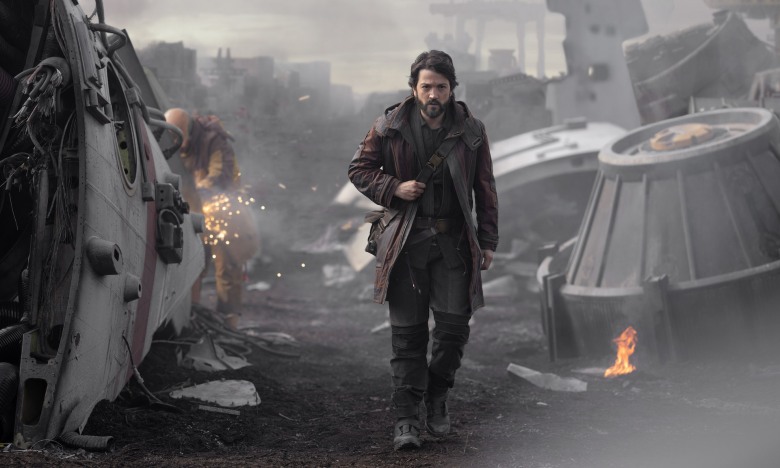
“Andor” has a lot going for it in the upcoming Emmys craft races as the best “Star Wars” since “Rogue One.”
With three “Star Wars” series competing for the first time in the same Emmy season — especially in the craft races — how can the critically acclaimed yet underperforming “Andor” hold its own against “The Mandalorian” (which has amassed 14 craft wins in two seasons), let alone the Jedi-infused “Obi-Wan Kenobi” limited series?
Simple: By touting its strengths as one of the top 10 shows of 2022 (per IndieWire’s Ben Travers), as well as the best “Star Wars” since “Rogue One,” which first introduced Cassian Andor (Diego Luna) as part of the daring mission to steal the Death Star plans. In the “Andor” prequel, created by Tony Gilroy (who co-wrote “Rogue One”), we find out how Cassian went from world-weary scavenger to conniving Rebel spy.
Beyond sci-fi, it’s a gritty spy thriller that emphasizes politics more than any other “Star Wars” show, slowly filing in the details of this complex loner, who will eventually light the fuse that ignites the rebellion against the Empire.
True, there are drawbacks to the Emmy chances of “Andor.” “Andor” isn’t as flashy as “The Mandalorian” or as iconic as Ewan McGregor’s return in “Obi-Wan Kenobi.” It’s the first “Star Wars” series to abandon the Jedi and their lightsabers, which disappointed fans and hampered viewership on Disney+. However, it delivers constant galactic tension throughout its 12 episodes and will complete Cassian’s five-year journey right up until the “Rogue One” mission in Season 2.
But “Andor” has already showed some awards promise by receiving early guild recognition. It won the ACE Eddie TV drama award for editing, and got ADG, VES, and SCLA nominations for fantasy production design, created environments, and Nicholas Britell’s brilliant score.

Diego Luna in “Andor”
Disney+
Part of the special allure of “Andor” is that it’s a Gilroy sibling collaboration, with Tony joined by screenwriter-director Dan (“Nightcrawler) and editor John (“Nightcrawler”). Unable to direct, Tony relied on the team of Toby Haynes (“Black Mirror”), Susanna White (“Billions”), and Benjamin Caron (“Wallander”). Plus, there were two additional writers: Stephen Schiff (“The Americans”) and Beau Willimon (“House of Cards”).
In keeping with the grounded and visceral quality of Gilroy’s feature work (“Michael Clayton”), a great deal of “Andor” was shot on location. Forgoing the Volume — ILM’s StageCraft LED wall used by the other “Star Wars” series — “Andor” set up shop around the U.K. (including a foggy Scottish landscape) and at London’s Pinewood Studios.
Although the three “Star Wars” shows will be submitted in all craft categories, “The Mandalorian” is expected to once again dominate for Season 3 (previously winning cinematography, production design, VFX, prosthetic makeup, score, sound mixing, stunt coordination, and stunt performance). However, “Andor” should be most competitive in editing, production design, and score (with the standouts being Episode 10’s “One Way Out” prison escape on Narkina 5 and the “Rix Road” finale).
Editing
What’s singular about “Andor” is that its dramatic beats are grouped into four, three-block mini-movies. This points to the strength of Gilroy’s blueprint, which helped bolster such standout editing. John Gilroy, who was new to TV, worked with Tim Porter (“Game of Thrones”) on the first three episodes and the Garrison payroll heist in Episode 6 (“The Eye”) with Dan Roberts (“Peaky Blinders”). The other episodes were edited by Hazel Baillie (“Black Mirror”), Frances Parker (Emmy winner for “Band of Brothers”), Matthew Cannings (“Black Mirror”), Simon Smith (Emmy winner for “Chernobyl”), and Yan Miles (“The Crown,” “Game of Thrones”). Smith won the ACE award for “One Way Out.”
“Andor” takes its time exploring Cassian’s childhood trauma through a series of emotional flashbacks in the first three episodes. In the second block, Cassian goes on his first heist; in the third, he is imprisoned on Narkina 5; and, in the fourth, his desire intensifies to join the rebellion and fight back against the Empire.
Production Design
Emmy winner Luke Hull (“Chernobyl”) was encouraged from the start to treat “Andor” as a grounded, political, period drama, and he delivered on this “Star Wars” departure, particularly with the sterile white prison on Narkina 5. But that’s not all: The detailed world building that went into the working class mining town of Ferrix, where Cassian lives, required that the art department construct an outdoor, practical build containing several city blocks. One of the highlights is a firefight in a warehouse with Cassian and Luthen (Stellan Skarsgård) taking on a dozen security guards.
By contrast, the luxurious galactic capital of Coruscant, where Luthen and Imperial Senator Mon Mothma (Genevieve O’Reilly) live, offered stunning visual contrasts. He owns an eccentric antique shop (full of “Star Wars” references) but leads a double life organizing the rebellion, and she leads a double life as their financier.
Original Score
“Succession” Emmy winner Britell was such a fan of Gilroy’s “Michael Clayton” that he was thrilled at the prospect of re-imagining the “Star Wars” musical landscape for “Andor.” And he was encouraged to lean into the gritty and dark vibe that reflects Cassian’s personal rage against the Empire, formed with the aid of a pulse motif. Britell was free to be experimental, so he used analog synths and created atmospheric elements. At the same time, there are passages very much in keeping with the majestic sweep of John Williams, courtesy of a 50-piece orchestra at AIR Lyndhurst Studios in London.
But there was also a very strategic on-camera musical sound of a bell ringer devised as a warning system on Ferrix. That rhythm was not only time-consuming to figure out, but it was also essential that it not be confused with the rest of the score.
Sign Up: Stay on top of the latest breaking film and TV news! Sign up for our Email Newsletters here.














